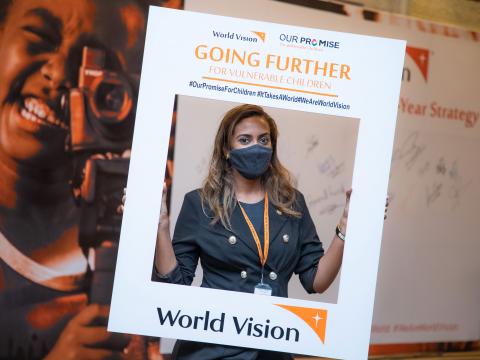World Vision renews its commitment for children in Sudan through its new five-year strategy

World Vision Sudan has launched its next five-year strategy (2021-2025), pledging to reach an estimated 2.1 million of Sudan’s most vulnerable children across Blue Nile, South Kordofan, South and East Darfur states. World Vision will maintain its current operations in these four states, but deepen efforts and operations into areas not previously accessible.
During the virtual launch on 24th March, Emmanuel Isch, Country Director for World Vision in Sudan said that the updated strategy reflected World Vision’s renewed commitment to vulnerable children in Sudan, and part of the organisation’s efforts to effectively use its resources, to achieve the greatest impact for children.
“Our strategy is a promise to vulnerable children in Sudan and our renewed commitment to continue pursuing our vision for every child, life in all its fullness, while at the same time we want to contribute to a number of SDGs (Sustainable Development Goals), and World Vision’s global strategy, known as ‘Our Promise',” Isch noted, expressing optimism about the promising new possibilities for children.
Mr. Isch also reiterated that going forward, in the new strategy cycle, World Vision will continue: learning and using lessons learnt from previous programmes, adapting its work and operations, as well as building on its strength, expertise, collaboration and partnerships, in order to further enhance its impact on children.
John Makoni, Senior Director of Operations for World Vision in the East Africa Region, expressed confidence and support for World Vision Sudan as they embarked on implementing the new strategy. Mr. Makoni was optimistic that the changing context as well as the progress being made in Sudan, offered promising opportunities for World Vision and other partners to effectively collaborate with the Government to adequately support the most vulnerable children.

Ms. Paola Serrao Emerson, Head of Office for the United Nations Office for the Coordination of Humanitarian Affairs (UN OCHA) Sudan, congratulated World Vision on the strategy launch, further acknowledging World Vision’s contribution in providing critical assistance to those who need it the most. “What I think is exceptional about the work that World Vision does, and more broadly international NGOs, is that you are in the communities directly, and the flexibility and the nimbleness with which you shift from life-saving humanitarian assistance, to resilience, and to development assistance.”
Ms. Paola also drew attention to the deepening humanitarian situation, not just in Darfur, South Kordofan and Blue Nile, where World Vision has operations, but other parts of the country, where she noted with concern, that already vulnerable people were becoming even more vulnerable. “In 2020, we saw five major shocks in Sudan: COVID-19 and its impact, locusts, floods, inter-communal tension, and the influx of refugees from Ethiopia, primarily from Tigray; all of that adding to the fragility and the vulnerability of the people, and putting a lot of pressure on the aid community,” Ms. Paola noted.
She also reflected on the changes happening in Sudan, pointing out that: “We will be looking and working in a very different Sudan in a couple of years, and this is where I think your knowledge of the situation on the ground, of the communities, and the work that you have been doing for many years will be instrumental in implementing more development programmes in the medium-run, and supporting the Sudanese people.”
The chief guest, Humanitarian Aid Commissioner, Dr. Ahmed Albashir Ibrahim, commended the work done by World Vision, UN agencies, NGOs and other partners. “The work that you are doing is what helps us get through the difficult times. We’ve had our rough times, not the least COVID-19, but I am sure that things will get better," he said.
The Commissioner pledged his continued support in facilitating the work of humanitarian partners in Sudan, acknowledging their critical role in supporting Sudan to address the humanitarian challenges it is grappling with. "We ask everybody for patience and we will do it together. Sudan requires all of its friends in this difficult transitional period.”
Some highlights from the recent-past strategy cycle (2016-2020)
In 2016, World Vision embarked on a journey to contribute to the well-being of 2.5 million vulnerable boys and girls in Sudan in the communities we work, through protection, education, health and nutrition, food security and livelihoods programmes, and access to water, hygiene and sanitation.
- World Vision adapted its work in order to more effectively meet the needs of vulnerable children. This included expanding operations into East Darfur, South Kordofan and Blue Nile states, and therefore reaching more vulnerable children.
- World Vision also expanded its scope to include refugee programming, enabling the organisation to respond to the needs of refugee children, thereby delivering on its promise to go where the greatest need is.
- Enhancing collaboration and partnership was also a critical part of World Vision’s work and strategy to achieve the greatest impact on the well-being of children. This included partnering with faith leaders, and using their platforms to make sure that children’s issues were effectively addressed across the communities.
Thank you note from World Vision Sudan:
World Vision wishes to sincerely thank all our partners who have supported us on this journey to advocate for children’s needs, to amplify their voices and opportunities, and to increase support for children toward their greater well-being. We look forward to continue on our journey, and to do this in partnership and collaboration.
Strategy is thinking about a choice and choosing to stick with your thinking.
-John Makoni- Senior Director of Operations for World Vision in the East Africa Region
To learn more about our new strategy priorities, click here.
By Lucy Murunga – Communications Manager, World Vision Sudan. Photos ©WorldVision.